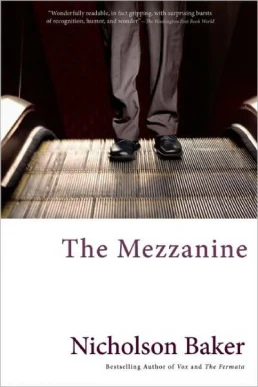Downloading The Mezzanine

In his startling, witty, and inexhaustibly inventive first novel—first published in 1986 and now reissued as a Grove Press paperback—the author of Vox and The Fermata uses a one-story escalator ride as the occasion for a dazzling reappraisal of everyday objects and rituals. From the humble milk carton to the act of tying one’s shoes, The Mezzanine at once defamiliarizes the familiar world and endows it with loopy and euphoric poetry. Nicholson Baker’s accounts of the ordinary become extraordinary through his sharp storytelling and his unconventional, conversational style. At first glance, The Mezzanine appears to be a book about nothing. In reality, it is a brilliant celebration of things, simultaneously demonstrating the value of reflection and the importance of everyday human human experiences.
From Publishers Weekly
Baker's irresistibly readable short novel presents the quirkyand often hilariousinner life of a thoroughly modern office worker. With high wit and in precisely articulated prose, the unnamed narrator examines, in minute and comically digressive detail, the little things in life that illustrate how one addresses a problem or a new idea: the plastic straw (and its annoying tendency to float), the vacuous ci vilities of office chatter, doorknobs, neckties, escalators and the laughable evolution of milk deliveryfrom those old-fashioned hefty bottles to the folding carton. Using the keenly observed odds and ends of day-to-day consciousness, Baker allows his narrator to re-create the budding perceptions of a child facing a larger mysterious world, as each event in his day conjures up memories of previous incidents. Through the elegant manipulation of time, and sharp, defining memories of childhood, the narrator dissects each item of apparent cultural flotsam with the thoroughness of a prosaic, though wacky, technical manual. The rambling "footnotes" alone are worth the price of this cheerfully original novel. Copyright 1988 Reed Business Information, Inc.
From Library Journal
Baker's first novel recounts one afternoon in the life of an office worker named Howie; or, more precisely, an afternoon in the life of Howie's mind . There are more digressions, asides, and tiny facets than one can imagine fitting into an afternoonor a short novel, for that matter. Each "real" event or actiongetting onto an escalator, for instanceis surrounded by the narrator's meditations on any number of thoughts or processes spawned by that event. A notable departure from traditional novel form is the extensive use of often lengthy footnotes, wherein many of the digressions take place. The line between the footnotes and the main text in fact tends to blur, with the reader drawn repeatedly into the highly detailed odysseys of the footnotes and then pulled back out. A very funny, enjoyable novel by a writer whose work frequently appears in The New Yorker . Jessica Grim, NYPLCopyright 1988 Reed Business Information, Inc.
